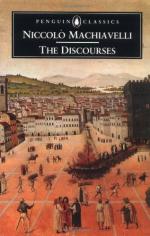
|
| Name: _________________________ | Period: ___________________ |
This quiz consists of 5 multiple choice and 5 short answer questions through Book One, The Development of Rome's Constitution, Sundry Reflections on the Kings of Rome, The Introduction of New Forms of Government, Ingratitude.
Multiple Choice Questions
1. What did Machiavelli identify as the cause of conspiracy against a hereditary Princes?
(a) Less powerful people desired the power of the Prince.
(b) The larger population of citizens became unhappy with the the political preferences of the Princes.
(c) The general population became dissatisfied with the distribution of wealth.
(d) They degenerated from their fathers, and surpassed others in sumptuousness and lasciviousness and in every other kind of delight.
2. How did Machiavelli begin the preface to "The Discourses"?
(a) With advice to two friends on how to keep their friends close and their enemies closer.
(b) As a warning to future generations of the tenuous nature of freedom.
(c) As a letter to two political thinkers from Florence.
(d) As a cynical commentary to the weakness of leaders of his time.
3. What can be inferred of Machiavelli's view of freedom based upon reading view of weak and strong Princes?
(a) That Machiavelli considers freedom only suited to those who can earn it or buy it.
(b) That Machiavelli uses the term freedom in reference to the actions of Princes only.
(c) That Machiavelli is focused on keeping cities free from outside influences rather than individual freedom.
(d) That Machiavelli considered civil rights and individual liberties indispensable to the strength of a city.
4. Why does Machiavelli claim these forms of government developed?
(a) To prevent people with the ability to use force from destroying each other.
(b) To provide defense for people who gathered together.
(c) So those with influence could hold it without violence.
(d) So those with wealth could protect themselves from those who had none.
5. According to Machiavelli, what caused the Roman Republic to form?
(a) Economic agreements between fertile cities.
(b) Class warfare between the patricians and the plebes.
(c) Political rivalries between powerful generals.
(d) Trade agreements between cities with resources and cities with technologies.
Short Answer Questions
1. What do fertile areas offer to those who settle there according to Machiavelli?
2. What are reasons Machiavelli cited for a group of people leaving their native country to seek a new home?
3. What did Machiavelli report led gatherings of people to make laws?
4. How long did Sparta peacefully exist without changing its laws, according to Machiavelli?
5. What does Machiavelli claim causes ingratitude from a conquered citizenry?
|
This section contains 489 words (approx. 2 pages at 300 words per page) |

|




